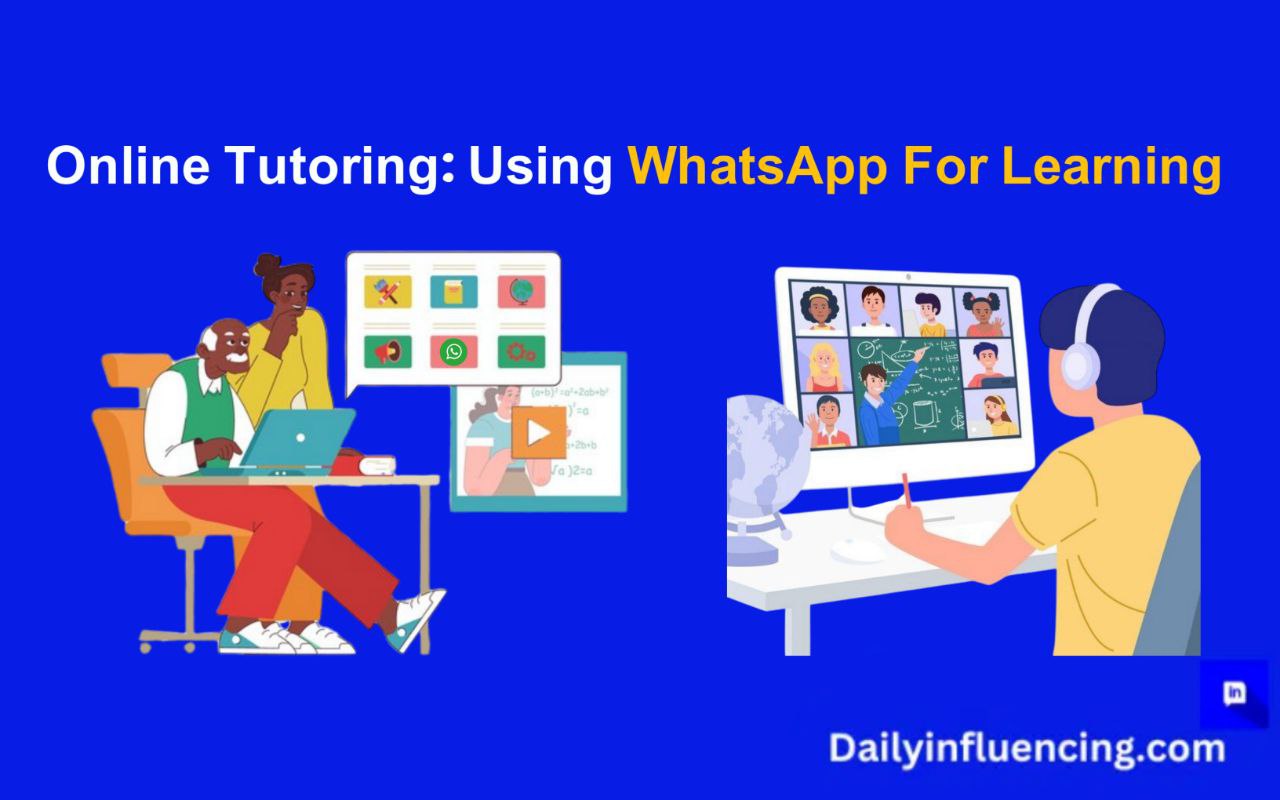
Make online tutoring easy with WhatsApp. Explore solutions, benefits, and expert tips for successful learning.
Unlocking Learning through Online Tutoring
The traditional classroom model has its limitations. Not every student learns at the same pace, and some may require additional support outside of regular school hours. This is where online tutoring comes in – a flexible and personalized way for students to receive the help they need. One of the most popular platforms used for online tutorials is WhatsApp.
In this article, we’ll explore the benefits of using WhatsApp for online tutoring and provide tips on how to get the most out of this platform.
Introduction to Online Tutoring via WhatsApp
So, what exactly is online tutoring, and how does it work? Online tutoring is a form of one-on-one instruction that takes place over the internet. It allows students to receive personalized support and guidance from a qualified tutor, regardless of their geographical location. WhatsApp is a popular messaging app that can be used for tutoring. It offers a range of features, including text messaging, voice and video calls, and file sharing.
The Rise of WhatsApp for Learning
WhatsApp has become an essential tool for many students and tutors. Its widespread adoption and user-friendly interface make it an ideal platform for online tutoring. Moreover, WhatsApp’s end-to-end encryption ensures that all conversations and data shared between tutors and students remain confidential and secure.
Benefits of Online Tutoring via WhatsApp
- Convenience and Flexibility: WhatsApp offers a convenient and flexible way for students to receive support and guidance from their tutors.
- Accessibility: Students can access their tutors from anywhere in the world, at any time, as long as they have a stable internet connection.
- Multimedia Support: WhatsApp’s multimedia features allow tutors to share a range of resources, including:
– Images
– Videos
– Audio recordings
- Engaging and Interactive Learning: The use of multimedia resources can help to make learning more engaging and interactive.
Getting Started with Online Tutoring
To get started with online tutoring via WhatsApp, there are several steps you can take. Firstly, you’ll need to create a dedicated WhatsApp group for your students. This will help you to keep track of conversations and ensure that students receive the support they need.
Creating a Dedicated WhatsApp Group
When creating a dedicated WhatsApp group, there are several things to consider. For instance, you’ll need to decide on a name for the group that clearly indicates its purpose. Additionally, you’ll need to set up the group’s settings to ensure that all members can participate fully.
Setting Up Group Settings
To set up group settings, follow these steps:
1. Open WhatsApp and go to the “Chats” tab.
2. Tap the “New Group” button.
3. Enter a name for the group and add a profile picture.
4. Add members to the group by selecting their names from your contact list.
5. Set up the group’s settings by going to the “Group Info” page.
Customizing Group Settings
Once you’ve set up the group, you can customize the settings to suit your needs. For example, you can:
- Change the group’s name or profile picture
- Add or remove members from the group
- Set up group administrators to help manage the group
- Enable or disable notifications for the group
Setting Boundaries and Expectations
Now that you’ve created a dedicated WhatsApp group, it’s essential to set boundaries and expectations for your students. This will help to ensure that everyone is on the same page and that the group runs smoothly.
Establishing Clear Rules and Expectations
To establish clear rules and expectations, consider the following:
- Set clear rules for the group, such as no spamming or off-topic conversations
- Establish expectations for response times and availability
- Encourage students to ask questions and seek help when needed
- Set boundaries around your availability and work hours
Effective Communication in Online Tutoring
It is critical for successful online tutoring. To ensure that you’re communicating effectively with your students, consider the following tips:
- Use clear and concise language in your messages
- Avoid using jargon or technical terms that students may not understand
- Use emojis and other visual aids to make your messages more engaging and interactive
- Encourage students to ask questions and seek clarification when needed
Teaching and Learning Strategies for Online Tutoring
Effective online tutoring requires more than just a good internet connection. To engage students and promote learning, tutors need to employ a range of teaching and learning strategies. In this section, we’ll explore some of the most effective strategies for online tutoring via WhatsApp.
Using Multimedia Files for Engagement
Multimedia files such as images, videos, and audio recordings can be a powerful tool for engaging students in online lectures. By incorporating multimedia files into their lessons, tutors can make learning more interactive and fun. Notably, this approach can lead to improved learning outcomes.
Benefits of Using Multimedia Files
- Increase student engagement and participation
- Improve understanding and retention of complex concepts
- Enhance the learning experience through interactive and immersive content
Strategies for Encouraging Student Participation
- Ask open-ended questions to encourage critical thinking and discussion
- Provide opportunities for students to share their thoughts and ideas
- Use polls and quizzes to encourage student participation and engagement
- Encourage students to ask questions and seek help when needed
Overcoming Challenges in Online Tutoring
While online tutoring via WhatsApp offers numerous benefits, it’s not without its challenges. In this section, we’ll explore some of the common obstacles that tutors and students may face, and discuss potential solutions.
Technical Issues and Solutions for Online Tutoring via WhatsApp
Technical issues can be a major hindrance to effective tutoring. Fortunately, many of these issues can be easily resolved with a little troubleshooting.
Some common technical issues that may arise include:
– Poor internet connectivity
– Difficulty with audio or video calls
– Issues with file sharing or downloading
To overcome these challenges, tutors can take several steps:
– Ensure that they have a stable internet connection before starting a session
– Use a reliable headset or earbuds to minimize audio issues
– Test their audio and video settings before starting a call
– Use cloud-based storage services to share files with students
Language Barriers and Cultural Differences
Language barriers and cultural differences can also pose significant challenges in online tutoring.
To overcome these challenges, tutors can:
- Use translation tools or services to facilitate communication
- Be sensitive to cultural differences and adapt their teaching style accordingly
- Use visual aids and multimedia resources to support learning
- Encourage students to ask questions and seek clarification when needed
Time Zone Differences and Scheduling
Finally, time zone differences can make scheduling online tutoring sessions challenging.
To overcome this challenge, tutors can:
- Use time zone conversion tools to schedule sessions across different time zones
- Be flexible and accommodating when scheduling sessions
- Use asynchronous communication tools, such as email or messaging apps, to communicate with students outside of scheduled sessions
Success Stories and Best Practices in Online Tutoring
Let’s now examine some success stories and best practices that can inform and improve our online tutoring efforts.
Case Studies
Several case studies demonstrate the effectiveness of online tutoring via WhatsApp. For instance:
- A study by the University of California found that students who received online tutoring via WhatsApp showed significant improvement in their math skills compared to those who did not receive tutoring.
- A tutoring program in India used WhatsApp to provide online tutoring to underprivileged students, resulting in a significant increase in student engagement and academic performance.
- A university in the United Kingdom used WhatsApp to provide online tutoring to students with disabilities, improving their access to education and academic support.
Best Practices
Based on these success stories and other research, here are some best practices for online tutoring via WhatsApp:
- Establish clear communication channels: Ensure that students know how to reach you and what to expect from the learning sessions.
- Use multimedia resources: Incorporate images, videos, and audio recordings to make tutorial sessions more engaging and interactive.
- Provide regular feedback: Offer constructive feedback to students on their progress, highlighting areas of strength and weakness.
- Be flexible and adaptable: Be willing to adjust your teaching approach to meet the unique needs and learning styles of each student.
- Monitor progress and adjust: Regularly assess student progress and adjust online learning strategies as needed.
Future Directions for Online Learning and Tutoring
As online learning and tutoring continue to evolve, several future directions hold promise:
- Artificial intelligence-powered tutoring: AI can help personalize online tutoring, providing real-time feedback and adapting to individual student needs.
- Virtual and augmented reality: Immersive technologies can create interactive, experiential learning environments that simulate real-world scenarios.
- Mobile-first design: Online tutoring platforms can be designed with mobile devices in mind, ensuring seamless access and usability.
CONCLUSION: The Future of Online Tutoring
As we conclude our exploration, it is clear that this innovative approach to education has the potential to revolutionize the way we learn. By leveraging the power of mobile technology and social messaging platforms, online tutors can provide personalized support and guidance to students anywhere in the world.
Final Thoughts on the Benefits and Potential of Online Lecturing via WhatsApp
In conclusion, online tutoring via WhatsApp offers a flexible, accessible, and effective way to support student learning. By harnessing the power of mobile technology and social messaging platforms, online tutors can provide personalized support and guidance to students anywhere in the world. As we look to the future, it is clear that online lecturing via WhatsApp has the potential to democratize access to education and provide new opportunities for students and tutors alike.
Recommendations for Further Research and Development
As online tutoring via WhatsApp continues to evolve, there are several areas that warrant further research and development. These include:
- Investigating the impact of online tutoring via WhatsApp on student outcomes and achievement
- Developing new teaching and learning strategies that are optimized
- Exploring the potential of artificial intelligence and machine learning to enhance lectures via WhatsApp
- Investigating the feasibility of using online classes via WhatsApp to support students with diverse needs and abilities.




